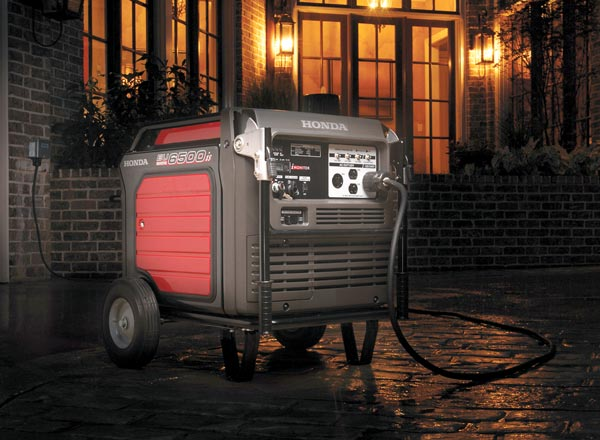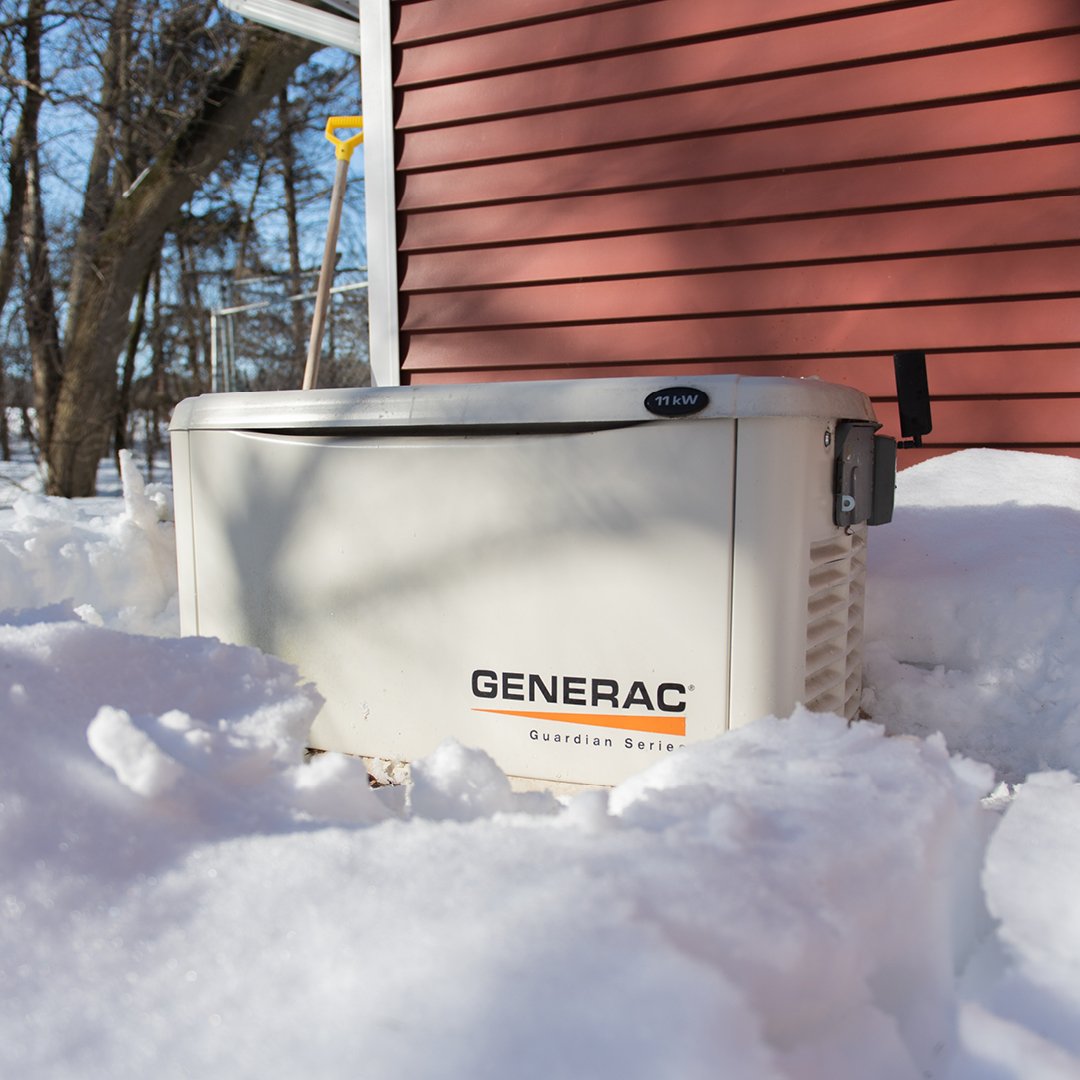Generators
Your Lifeline
When The
Power Goes Out
Power outages are an unpredictable inconvenience that can disrupt daily life in the foothills of Nevada County in California, but they don’t have to leave you in the dark. Whole house generators offer a reliable source of backup power when the electricity grid fails whether it’s due to snow, fire or PG&E planned outages. Two common options are whole house generators (standby generator) and portable generators, each with its advantages and disadvantages. Let’s explore both choices to help you decide which one suits your needs best.
Whole House Generators
Advantages
Seamless transitions: Whole house generators, also known as standby generators, are permanently installed outside your home and connected to your electrical panel. When a power outage occurs, these generators automatically start within seconds, ensuring an uninterrupted power supply.
Capacity for Entire Home: Whole house generators are capable of supplying power to your entire home, including essential appliances like HVAC systems, refrigerators, lights, medical equipment, and even sensitive electronics. You can maintain your usual lifestyle without disruption.
Automatic Operation: Standby generators are fully automated, which means you don’t need to manually refuel or start them. They are fueled by your home’s natural gas or propane supply, eliminating the need for transporting gasoline or diesel.
Safety and Security: Continuous power supply ensures the safety and security of your home during extended outages. Your security system, sump pump, and medical equipment (if applicable) remain functional.
Disadvantages
High Initial Cost: Whole house generators are a significant investment, including the cost of the generator unit, installation, permit fees, and necessary electrical work. In Nevada County, a permit is required to install a standby generator. Pulling a permit may trigger your property value to be reassessed and may increase your property tax. This is an expense that is rarely discussed up front and leaves a homeowner frustrated when they receive an increased tax bill.
Professional Installation: Installing a whole house generator requires professional expertise, which can add to the overall cost. You’ll need a licensed electrical contractor and licensed plumber to ensure safe and compliant installation. Theos Electric hires a licensed and insured plumber to do the plumbing portion of the project to ensure it is done safely and to code. Upon completion of the installation, a Nevada County Building Inspector will inspect for code compliance and correct installation.
Maintenance: Standby generators require maintenance, including oil and filter changes, battery checks, and overall system inspections. Maintenance costs should be factored into your annual budget.
Operational Cost: The cost of fuel in your location is a significant factor. Fuel prices can fluctuate based on regional and global factors, impacting the overall cost of running a generator. The size and capacity of the generator are crucial factors. A larger generator capable of handling more electrical load will consume more fuel. The size should be chosen based on the power requirements of the website's equipment and systems. Different generators have varying levels of fuel efficiency. Modern, well-maintained generators tend to be more fuel-efficient, which can result in lower operational costs. The frequency and duration of generator use will directly affect costs. If the generator runs continuously or for extended periods, fuel consumption will be higher, leading to increased operational expenses. One way to minimize fuel cost is by manually turning off the generator at night and on in the morning.
Portable Generators
Advantages
Affordable Options: Portable generators are a cost-effective choice with prices ranging from a few hundred to a couple of thousand dollars. They are readily available and can be a practical solution for occasional power outages. Locally we have experienced supply shortages during heavy snow storms so plan ahead.
Versatility: Portable generators are versatile and can be used for various applications, from providing power for camping trips and outdoor events to supplying emergency power at home.
Installation: Setting up a portable generator is relatively straightforward. You can connect it directly to appliances with an extension cord or to your home’s electrical system via a transfer switch or interlock kit for select circuits. It is recommended to hire a licensed electrician to install the transfer switch. The cost for installing a transfer switch is significantly less than a standby generator.
Disadvantages
Limited Capacity: Most portable generators have a limited power capacity. They can’t provide electricity to your entire home, so you must prioritize which appliances and circuits to power. This can be inconvenient during extended outages.
Manual Operation: Portable generators require manual operation. You must refuel them, start them, and manage fuel storage. This can be challenging, especially during severe weather conditions. Many portable generators now have a simple start switch, no longer requiring a pull start.
Noise and Emissions: Portable generators can be noisy and emit harmful exhaust fumes so ensure proper placement and ventilation to avoid carbon monoxide poisoning.
Shorter Lifespan: Compared to whole house generators, portable generators generally have a shorter lifespan due to their smaller engines and the wear and tear associated with frequent movement and use.
Maintenance: Proper maintenance will help extend the lifespan. Here are some key maintenance tasks: check the oil level, use fresh fuel and add fuel stabilizer (if not used regularly, drain and replace fuel), air filter, spark plug, battery maintenance, and run the generator for a short time (10 to 15 minutes) every month. Always consult the owner’s manual that came with your portable generator for specific maintenance instructions and schedules. Different generators may have slightly different requirements.
Conclusion
Choosing between a whole house generator and a portable generator depends on your specific needs, budget and physical limitations. Whole house generators offer seamless, automatic,and comprehensive power solutions but come with a higher initial cost. If you plan to use propane as a fuel source for a standby generator, be sure to ask if your tank size is large enough. Some customers chose to install a second propane tank because filling up during snow storms can be difficult or even impossible if the truck can’t get to you. Portable generators are more budget-friendly and versatile but require manual operation and have limited capacity. Consult with a licensed electrician or generator dealer for precise sizing and to ensure compliance with local codes. They can perform load calculations, assess your home’s electrical system, and recommend the right generator size.
Consider your power requirements, the frequency and length of outages in your area, and your willingness to invest in a long-term, automated solution. When purchasing a portable generator, consider type of fuel you prefer and its availability. Before you purchase a standby generator, ensure your gas supply (propane or PG&E natural gas) can meet the generator’s demands.
Ultimately, both options can provide valuable backup power during emergencies, ensuring you stay comfortable and safe when the grid goes dark.
Have more questions? Please contact Theos Electric for answers.
CLICK ON THE BELOW IMAGE FOR MORE INFORMATION FROM MANUFACTURE WEBSITE
Kohler Generator installation
Honda Portable Generator for transfer switch
Generac standby generator installation





